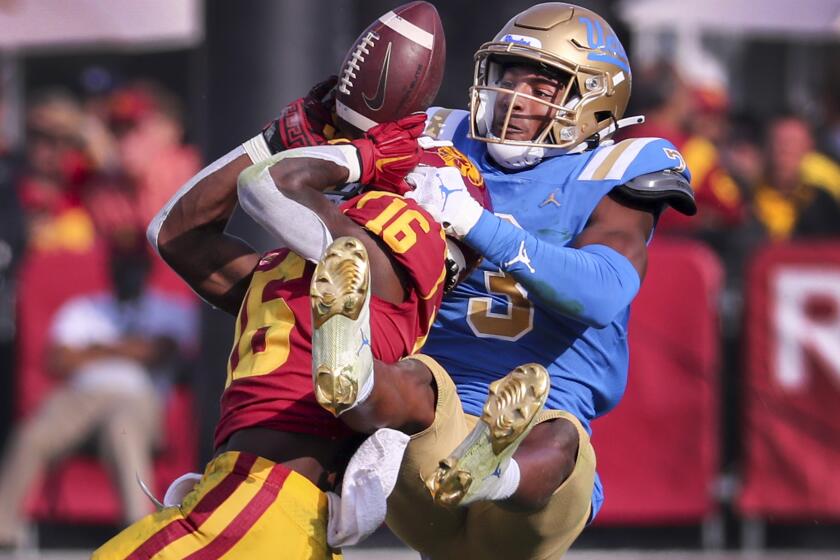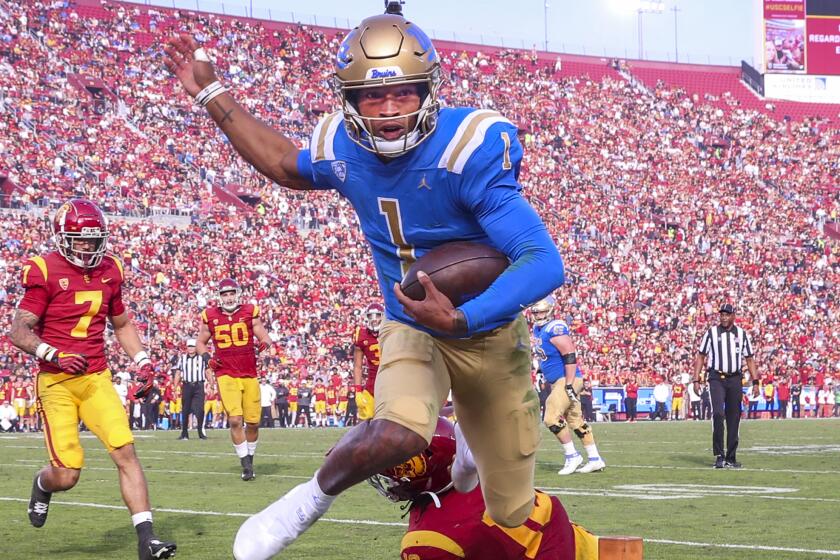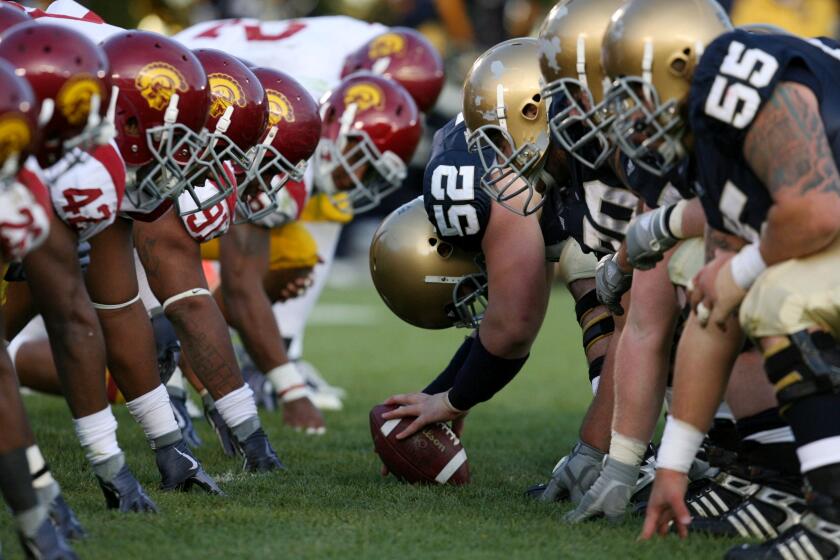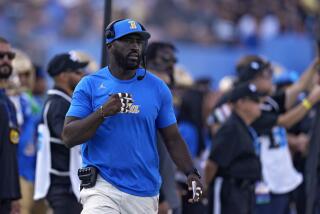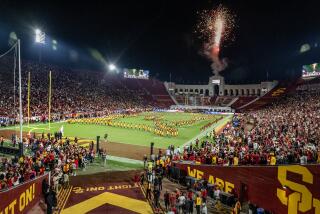Big Ten’s new media-rights deal: Better start times, more national exposure for UCLA, USC
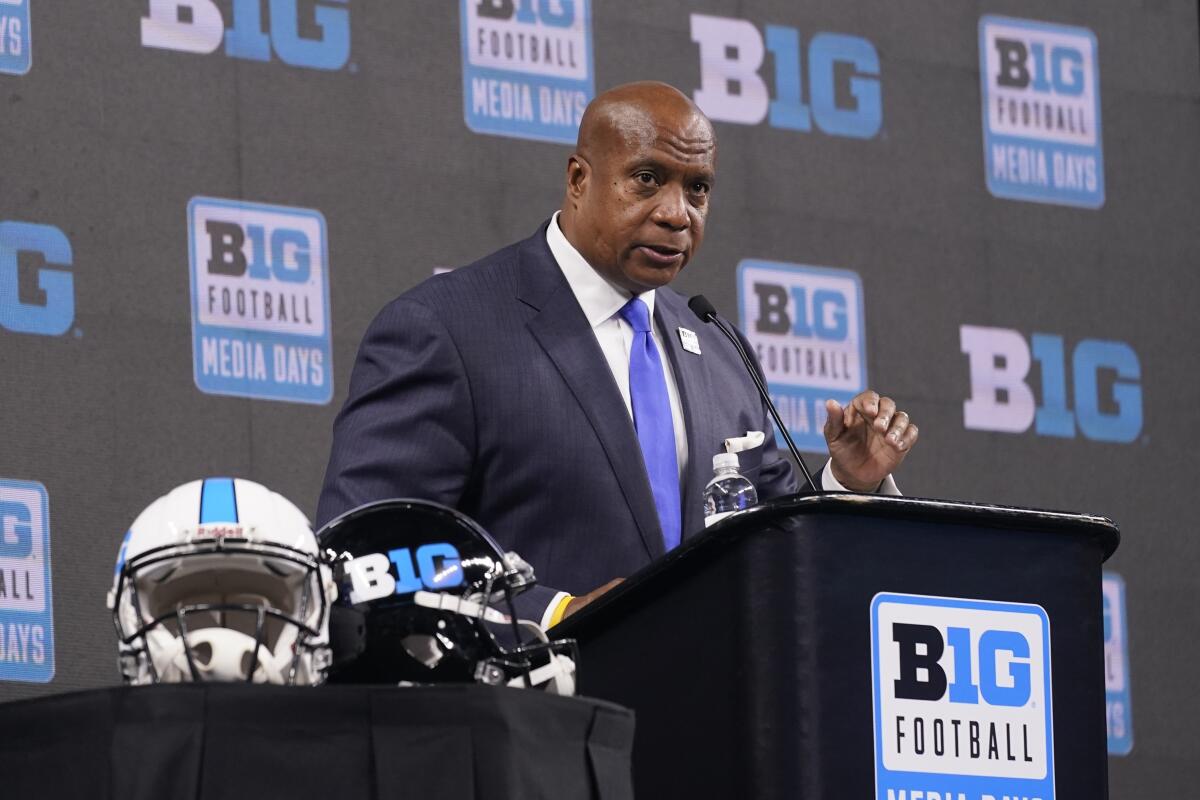
The Big Ten has finalized a monumental media-rights agreement inspired by the NFL’s coast-to-coast takeover on Sundays — and paves a path to ending those late-night USC and UCLA games that only part of the country watches.
As of next fall, the conference will feature morning games on Fox, afternoon games on CBS and prime-time games on NBC.
“I think this media deal will give more attention to the West Coast schools,” Big Ten Commissioner Kevin Warren told The Times. “We’ll be starting at 9 in the morning Pacific time, and because of the quality of the games, with fans across four time zones, it’s going to give validity and credibility to all our games, from the morning, throughout the day and into the night.”
The Big Ten, which officially adds USC and UCLA in 2024, announced the long-awaited media deal Thursday. The seven-year pact that begins in 2023 is worth more than $1 billion per season. In fact, the total value of the deal is nearly $8 billion, with financial escalators that could push it to nearly $10 billion, according to individuals with knowledge of the negotiations but not authorized to speak about it on the record.
The massive deal could give UCLA some high-caliber ammunition in its bid to secure Big Ten membership and ward off the University of California regents who have openly raised the possibility of blocking the school’s planned move from the Pac-12.
University of California system leaders proposed new rules that may limit campuses from making major athletics contract decisions on their own.
Warren, a former Minnesota Vikings executive, said some of the strategies and truisms he learned in the NFL are reflected in this agreement.
“One thing that I really admire about the NFL is they have done a really good job of creating brand credibility and fan avidity,” he said. “The way you do that is you have to make it as simple as it can possibly be for fans to find the content that they’re looking for. With this new structure, I want fans on Thursday to start thinking about what they’re going to be doing on Saturday, to know that they’ll be able to start their day with Fox and roll right into an afternoon with CBS and an evening with NBC.
“Then I want our fans to hear on Sunday about all the great college football that they watched on Saturday. The cross-marketing opportunities are going to be powerful.”
USC and UCLA are leaving the Pac-12 for the Big Ten Conference in 2024, the two schools announced Thursday.
The agreement gives the Big Ten unprecedented coast-to-coast exposure, significantly enhanced by the addition of the two Los Angeles universities.
“From a television standpoint it totally cements the Big Ten as having a national footprint,” said Sean McManus, chairman of CBS Sports. “[Having USC and UCLA] makes the selection process easier, because you now have two teams with a great national following and a West Coast presence, and it delivers to us the second-largest television market in the country. So from a value standpoint, the conference is more valuable with USC and UCLA in it.”
What the deal doesn’t feature is ESPN, a Big Ten media partner since the early 1980s. However, Fox will remain the conference’s main media partner. The agreement is backloaded, with the disbursements gently sloping upward in the first two years and increasing significantly in Years 3 through 7.
Warren said there was flexibility built into the deal in the event the Big Ten expanded further.
“The elements of potential expansion have been addressed from the first meeting that I had over a year ago,” he said.
Big Ten Commissioner Kevin Warren talked about additions of USC and UCLA, and what the future might hold for the conference during media days Tuesday.
The current media rights agreement expires at the end of the 2022-23 academic year.
Under the new agreement, the Big Ten championship games will rotate among Fox, CBS and NBC.
The conference will have a presence on broadcast television from morning to night on Saturdays, with Fox games beginning at 9 a.m. PDT, CBS at 12:30 p.m. PDT and NBC at 5 p.m. PDT. Also, games will air on FS1 and the Big Ten Network, and will be streamed on Peacock.
Fox has renewed its agreement to broadcast football and men’s basketball games each season.
CBS will air the Big Ten men’s basketball tournament semifinals and final, as it has for the past 25 years. For the first time, CBS will air the women’s basketball championship as well. The network will air seven of the conference’s football games next season and as many as 15 each year for the remainder of the deal. Every CBS Big Ten football and basketball game will also be streamed on Paramount+.
The college football landscape saw a dramatic shift when it was announced USC and UCLA would join the Big Ten. Here’s what to expect moving forward.
The NBC inventory includes 16 games in 2023, and 14 to15 per season from 2024 to 2029.
BTN will remain the home for Big Ten fans and will continue to televise a slate of football, basketball and Olympic sport competitions throughout the school year.
Peacock will stream eight football games per year throughout the life of the deal, 47 men’s basketball games, and of the Olympic sports, up to 40 live events per year.
“My focus is always to meet our customers where they are, because we have fans around the world,” Warren said. “We have young fans, we have fans who have been watching Big Ten sports for over 50 years. I focus on making sure that our fans from ages 5 to 105 can consume content in a way that’s most comfortable for them.”
University of California system leaders proposed new rules that may limit campuses from making major athletics contract decisions on their own.
Staff writer Ben Bolch contributed to this report.
Watch L.A. Times Today at 7 p.m. on Spectrum News 1 on Channel 1 or live stream on the Spectrum News App. Palos Verdes Peninsula and Orange County viewers can watch on Cox Systems on channel 99.
More to Read
Go beyond the scoreboard
Get the latest on L.A.'s teams in the daily Sports Report newsletter.
You may occasionally receive promotional content from the Los Angeles Times.

